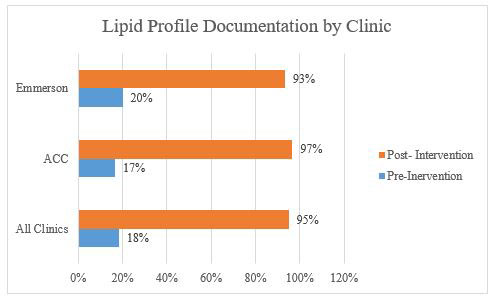Session Information
Session Type: Poster Session B
Session Time: 9:00AM-10:30AM
Background/Purpose: Patients with Rheumatoid Arthritis (RA) have 50% increased risk of cardiovascular disease (CVD) mortality compared with the general population. The American College of Cardiology/American Heart Association (ACC/AHA) and European Society of Cardiology (ESC) guidelines may not be applied without assessing lipid levels, and lipid screening may not be adequate in patients with RA. As part of a quality improvement plan, we report on cardiovascular risk factor screening in academic practice.
Methods: A retrospective chart review was performed among patients with RA in an academic medical center in the United States from 2020 – 2021. Two distinct practices were surveyed, an inner-city practice and a private practice setting. Descriptive statistics were used to report the prevalence of screening and patient characteristics between the two cohorts.
Results: Among 60 patients with RA followed by rheumatologists and primary care physicians (PCP), most of the patients 40 (66%) were African Americans, 19 (32%) were Caucasian. Majority of the patients were above age 45. There were more females (85%) compared with males (15%). Annual PCP visit was noted among 77% of the patients and lipid screening was ordered for 37 (62%) of the patients within the previous 1 year period. Lipid panel was requested by PCP most of the time 78% (21) compared with rheumatologist 19% (5). Rheumatology follow up was noted to be 100% among all patients but lipid documentation was only seen in 18% of the patients. Intervention was designed and implemented by the practice. Updating our patient quality reporting initiative (.PQRI) dot phrase allowed us to capture lipids among every RA patients subsequent visit. Three months after intervention implementation, 95% of the patients had documentation of lipid screening using the updated dot phrase.
Conclusion: Lipid screening is crucial for patients with RA to assess CVD risk. Since rheumatologists tend to see patients on a more frequent basis than primary care providers, there is an opportunity to collaborate with the primary team to optimize cardiovascular risk factors in patients with rheumatic diseases. After intervention was applied of dot phrase in updating the patient quality reporting initiative (PQRI), documentation of lipid screening improved across the practice. Improving quality of documentation allows for capturing those poorly screened for cardiovascular risk in rheumatoid arthritis.
To cite this abstract in AMA style:
Singh S, Kaeley G. Screening of Lipids in Patients with Rheumatoid Arthritis: Academic Rheumatology Practice Quality Improvement Analysis [abstract]. Arthritis Rheumatol. 2022; 74 (suppl 9). https://acrabstracts.org/abstract/screening-of-lipids-in-patients-with-rheumatoid-arthritis-academic-rheumatology-practice-quality-improvement-analysis/. Accessed .« Back to ACR Convergence 2022
ACR Meeting Abstracts - https://acrabstracts.org/abstract/screening-of-lipids-in-patients-with-rheumatoid-arthritis-academic-rheumatology-practice-quality-improvement-analysis/


